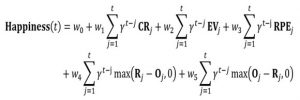Apparently, science has figured out happiness. It is, of course, a simple equation to science. No more than that as is generally the case with science. The study turned out to state that inequality tends to have a direct and lasting effect on happiness.
It did not matter to the test subjects who was doing better than who. It just suggested that current perceived inequality produced unhappiness in the research subjects. The experiments involved gambling and every one was able to see how everyone else did on certain gambles. People, of course, were happier when they won and less happy when they lost. When they had partners, not only were people happy when they won, but they were equally happy when their partner lost.
Lead researcher Dr. Robb Rutledge of the UCL Institute of Neurology, stated that, “Our equation can predict exactly how happy people will be based on not only what happens to them but also what happens to the people around them. On average, we are less happy when people get more or less than us but this varies a lot from person to person. Interestingly, the equation allows us to predict how generous an individual in a separate scenario is when they are asked how they would like to split a small amount of money with another person.”
Where t is the trial number, w0 is a constant term, other weights w capture the influence of different event types, 0 ≤ γ ≤ 1 is a forgetting factor that makes events in more recent trials more influential than those in earlier trials, CRj is the certain reward if chosen instead of a gamble on trial j, EVj is the average reward for the gamble if chosen on trial j, and RPEj is the RPE (reinforcement prediction error) on trial j contingent on choice of the gamble. The RPE is equal to the reward received minus the expectation in that trial EVj. If the CR was chosen, then EVj = 0 and RPEj = 0; if the gamble was chosen, then CRj = 0. The variables in the equation are quantities that the neuromodulator dopamine has been associated with in previous neuroscience studies. The additional term w4 relates to advantageous inequality (guilt) when the reward received by the subject Rj exceeds the reward received by the other player Oj, and w5 relates to disadvantageous inequality (envy) when Oj exceeds Rj.
The study consisted of 47 people who were assigned several small tests including one where they had to split some winnings with other people. When splitting the money, it didn’t seem to matter to people who they had to split it with. Their individual feelings for a person didn’t matter. Their generosity and altruism, it seems, sprung from the type of character that they already had.
Archy de Berker, another lead on the study said, “Our results suggested that generosity toward strangers relates to how our happiness is affected by the inequalities we experience in our daily lives. Such methods could help us to better understand certain aspects of social disorders such as indifference to the suffering of others.”
PHOTO CREDIT: Dr. Robb Rutledge, et al

